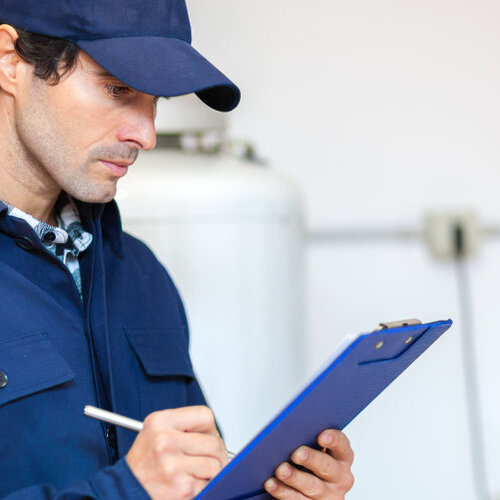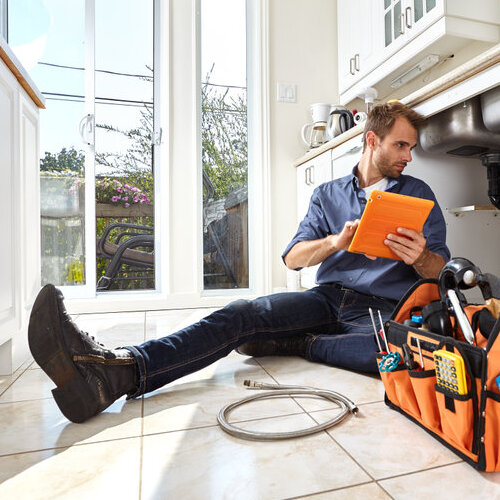
Why is plumbing maintenance important?
When was the last time you had your home’s plumbing inspected? Yeah, that’s what most homeowners will say – never. One of the most helpful p plumbing tips a homeowner can take to heart is to keep a regular plumbing maintenance routine and have annual plumbing maintenance by a professional plumber to minimize, or even prevent, major plumbing problems.
Of all the helpful advice experienced homeowners will offer, listen to them when they are offering plumbing tips. The plumbing in your home is essential and important to the daily household routine. A clogged drain or a leaking pipe can be inconvenient and expensive. With routine plumbing maintenance by you and a professional plumber you can possibly prevent the following problems:
- Blockages
A blocked and clogged drain can cause as much damage and as many problems as a leaking pipe, including flooding. By keeping your pipes free from blockages and clogs, you’ll decrease the chances of overflowing sinks, toilets, and tubs within your home. This will also extend the lifespan of your plumbing. A couple of plumbing tips to help minimize blockages is to use a drain screen in each sink to catch hair and larger debris that can clog a drain. And pay attention to seemingly minor things you may be washing down the drain, like coffee grounds and grease! They can cause far more problems than you realize.
- Low Water Pressure
With regular plumbing system maintenance you can catch any build-up of mineral deposits and gunk in the pipes that can decrease your water pressure. You can also catch small leaks where the water isn’t getting to the faucet, making it seem your water pressure is low.
- Expensive Repairs
When you catch a clog as it’s building up and get it cleared, you won’t have a busted pipe to fix and you won’t have to deal with the damage it can cause around the pipe. Water is the enemy to any house when it’s left to flow and leak. Keeping your home’s plumbing pipes clean and clear and keeping leaks patched can save you a lot of money.
What does a maintenance plumber do?
A professional plumber will have a plumbing maintenance checklist they will work through. On that maintenance checklist are:
- Check for indications of water damage on the walls or under cabinets
- Inspect the plumbing pipes for damage or corrosion
- Check the toilets for leaks and they’re flushing correctly
- Verify that all faucets in the bathrooms, kitchen and other areas have proper water pressure
- Check for potential blockages and clogs
- Inspect the garbage disposal and water heater
- Conducting a pressure test to detect any hairline cracks or leaks
- Perform drain cleaning on all drains
Occasionally, if the plumber determines it is needed, they will perform a lead test of the water and do a video pipe inspection of the sewer lines. These aren’t always included on routine maintenance inspections, however. At the end of the inspection, the plumber may offer you plumbing tips to correct an issue before it becomes an expensive problem.
What is included in preventive maintenance?
Your plumbing preventative maintenance routine will involve everything that is attached to the water system in your home. This includes all sinks, toilets, and tubs. The laundry room, garbage disposal, refrigerator ice maker, and water heater.
Anything that is attached to the plumbing should be inspected. If you find any issues, make the repairs needed or call a professional plumber. Here, we offer preventive maintenance plumbing tips to follow:
- Fix any leaking faucet or shower head. A dripping faucet is wasting water and adding up on your water bill. A dripping faucet left un-repaired can cause extensive water damage. This includes the handles dripping when turned on. Check under the sinks for drips or water stains.
- Unclog slow drains. Any drain that is slow could get worse at any moment. Pour half a cup of banking soda and half cup of vinegar down the drain, wait 15 minutes then pour boiling hot water. This can be done on a weekly basis to keep drains running clear.
- Check all exposed pipes for water leaks, including plumbing to all appliances. Every appliance can have a possible leak, including the garbage disposal, ice maker, or water heater. Always keep a watch for any visible signs of a leaking like water stains on ceilings, walls, and puddles in floor. Be aware of mildew and make sure the drip tray under the water heater and HVAC unit are clear.
- Fix leaking toilets by replacing the faulty valve seat seal or the flapper. Make sure the handle is connected to the tank stopper and working.
- Watch what is getting flushed or poured down drains. Just because it says flushable, doesn’t mean it should be flushed! The only things that should ever be flushed is human waste and toilet paper, and never anything that can be reactive down a drain.
- Check the water pressure from the faucets and showerheads to make sure they are not too high. High water pressure can bust water lines.
- Remove the shower and clean the sediment that has built-up.
- Drain and flush the water heater to remove the sediment build-up
- Check the water heater burner chamber and if you see rust flakes or the flame is yellow, the jets need to be cleaned.
- Check the hoses for brittleness, cracks, or leaking and replace if needed.
- Have your septic tank inspected and pumped by a professional service.
- For houses with a sewer system, have the sewer lines inspected for cracks and tree roots.
How often is it recommended to do plumbing maintenance?
Have your home’s plumbing checked professionally every two years. The exception to this would be for an older home or a home with large trees around, in which case, once a year would be recommended. The checklist of plumbing maintenance for homeowners we provided, along with the plumbing tips offered, should be taken care of weekly unless otherwise stated.

In Closing
When you learn how to maintain a plumbing system, you’ll find that you’re saving money on water, and you won’t need plumbing repairs as frequently. Commercial or residential building plumbing maintenance is essential in keeping thing running as smoothly as possible.
